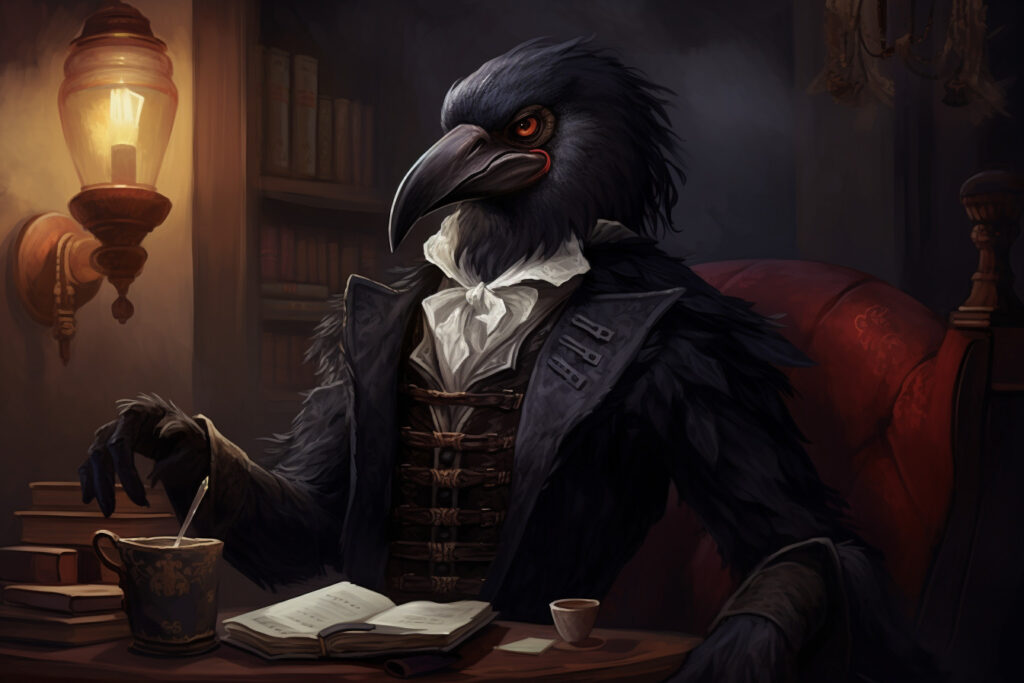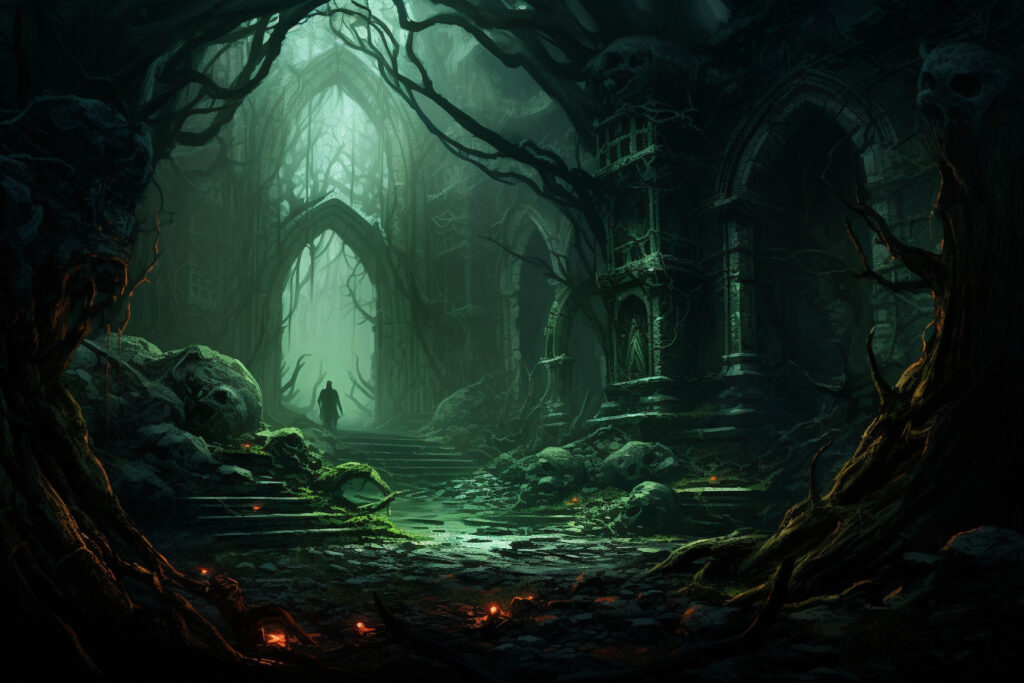While walking through town, the party notices a creepy-but-beautiful house surrounded by a wrought iron fence. A few young people, dressed in dark, Gothic attire, are standing at the edge of the property outside the front gate, holding various signs saying things like…
- You got this, Edgar! Put quill to paper!
- Your fans love you; finish the series!
- Your words are our world; WRITE, WRITE, WRITE!
If the party asks any of these youth about their apparent “protest”, they will explain that their favorite horror author, Edgar Allan Crow, hasn’t given his adoring fans a new novel in almost three years.

“A few days ago,” one of the teens comments, “he appeared on the balcony, and we hollered up to him, asking when he would publish his next book. He squawked ‘nevermore!’ before ruffling his feathers and storming back inside.”
“Oh, he was just being melodramatic,” a young woman chimes in. Then, turning to the party, she says, “he rarely comes out at all anymore. We just see his silhouette pacing back and forth in front of the windows.” She sighs. “It’s so dreamy how he’s tortured by his art.”
If the players jump the iron gate, the teens will gasp and shake their heads, as though they have just witnessed the players deface hallowed and sacred ground. Aside from that reaction, nothing else happens, and the party can approach the house.
After knocking on the front door, a small rectangular slit slides open, revealing the beady eye of a kenku. The bird will carefully examine the party, his eye glassy and dilated, in an attempt to assess whether the players are simply more of his overeager (and pushy) fans. When he can tell you’re not fanboys/girls, he asks the party:
“What brings you late visitors rapping, tapping at my chamber door?”
The party can try to persuade Edgar that they want to help him with his alleged writer’s block (or, perhaps, roll deception and convince him that they’re a team of ghost writers sent from the publishing house to assist him). Regardless, if the players can make a good case (and roll well), the kenku will unlatch a series of chains, deadbolts, and locks, before allowing the door to ominously creak open. From way back at the front gate, the Edgar Alan Crow fan club gasps in awe, whispering to one another things like “Oh my gosh…they’ve been chosen!“
The Price of Genius
The interior of Edgar Allan Crow’s house is lavishly decorated, a testament to his great success as an author/poet. The decor, however, is rather disturbing: beautiful chandeliers hang from the ceiling, but instead of crystal, they are elegantly fashioned from animal bones…strange glowing substances in bottles and jars line the mantel above the fireplace…paintings adorn the walls, depicting frightening monsters and strange, otherworldly places. Bookshelves are crammed full of leatherbound books and scrolls, many of them copies of the author’s own work.
Edgar pours each player a glass of exquisite amontillado as they all sink into large plush armchairs beside the hearth, warming themselves after being out in the chilly night air.
At first, Edgar is dodgy about his writer’s block and lack of recent publications. If the players can help him feel comfortable by convincing him that they truly have his best interests at heart, he will start to open up more about his situation, eventually confessing the truth (especially if he’s already thrown back a few glasses of amontillado).
“The truth is…I don’t have any creativity,” Edgar says, burying his face in his hands, “I’ve never had any creativity. It’s the kenku’s curse, you know. But I’ve been fortunate enough to not need it…you see…”
He points a feathery finger to a locked wooden door.
“…I’ve gotten my ideas from down there. The basement. I just observe and mimic, in my writings, what I see.”
If the players ask to see the basement for more clarification, Edgar Allan Crow will pull a large skeleton key from his robe, unlock the door, and hesitantly lead the party down into the darkness.
The Write of Passage
The basement staircase feels longer than those of most houses. At the bottom, players see very little of interest: dusty boxes, crates filled with more amontillado and other spirits, trunks full of jackets and fancy clothes. However, at the far end of the basement, a tall object is covered with a white sheet.
“I’ve never shown anyone this before,” he says softly, “but keeping this secret is doing me little good now.”
Edgar whisks away the cloth, revealing an ornate frame of gold. Inside the frame is a swirling portal of black and green light.
“Family heirloom,” Edgar says, “it’s a doorway…to…” he allows the suspense to build in his pause, like a true writer of mystery and horror, “the abyssal plane.“
If any players react, the author will lift his wings and attempt to deescalate the situation. “Don’t worry though! It’s totally safe.” He rubs his finger across a column of runes inscribed into the golden frame. “This enchantment ensures that only we can travel to and from the abyss; what’s in the abyss, stays in the abyss.”
Edgar explains that, for the past 15 years of writing, he has been dipping into the abyss for inspiration for his stories: watching the various demonic denizens going about their days and recording/memorizing what they say and do.
“Circumstances have changed though,” Edgar says with a sigh, “I don’t know why, but all the creatures that once lived near the portal have all gone away. If I’m going to find more inspiration, I will need to go deeper into the abyss, but I just haven’t found the courage to do so. Maybe…” he sizes up the players with twinkling eyes. “You are all could be my guides? We wouldn’t need to stay for long. A couple of hours tops. If you help me find my next stroke of inspiration and get me safely home again, I promise you a generous cut from my next book. A royalty, if you will…”
If the players agree, they can enter through the portal, one at a time, and be pulled into the abyss.
What’s Amiss in the Abyss?

As expected, the environment around the portal is unsettling and eerie: twisted, gnarled trees line surround the clearing, and the dark sky above is concealed behind heavy, low-hanging clouds. Everything is cast in a sickly green hue.
Although there is plenty of flora in the area, the fauna is indeed lacking. The air is silent, and any indication of fiend activity is nowhere to be seen.
The party can choose to investigate the surrounding area and walk with Edgar farther and farther from the portal. Note: the portal stays active and will not vanish or be otherwise magically sealed.
Eventually, while strolling through the abandoned abyss, Edgar Allan Crow stops dead in his tracks. He closes his eyes or a moment, nodding his head to himself.
“Yes, yes. I hear the voice of my muse again.” He says, smiling to himself. “She’s calling me…” he looks around through the ruined buildings and tangled trees, “This way.”
The party can attempt to determine the source of his “muse”, but Edgar cannot be convinced that it’s anything but the whispering voice of creativity (in fact, it is a telepathic demon luring him into a trap).
Destroy Your Darlings
Players eventually arrive at the mouth of a large cave. Edgar insists that his muse is encouraging him to venture inside to find the inspiration for his next great masterpiece.
If the party does so, the entrance to the cavern immediately closes behind them, sealed by a stone door. The enormous room is cast in darkness, and a booming laugh can be heard resonating off the cave walls.
A large glabrezu (demon) drops from somewhere in the upper reaches of the cave, landing with a heavy thud on the ground in a pose of Iron Man-inspired finesse. Additionally, four far-less-graceful dretches come waddling out from their hiding places behind the surrounding stalagmites.

“We have you now, writer,” the glabrezu growls, holding up a battered and slime-covered copy of one of Edgar’s novels, “your books have been sharing our private business with the world and painting us as evil, and we demons have had enough!”
Edgar tilts his head to one side, “But…but you are evil.”
“Exactly,” the glabrezu says. “And you telling everyone just how evil we are isn’t making our job of causing mischief any easier. Now, we put an end to this once and for all.”
At this point, the party has a couple of options:
- Fight: This is the most likely course of action; the demons are already angry and, unless the party somehow sabotaged the door mechanism, the demons have the upper hand with the players being trapped. If the party manages to defeat the glabrezu, any bumbling dretches that are still alive will begin to flee and take cover, unable to devise any meaningful plan of attack without their valiant fiendish leader.
- Compromise: This would require some major convincing (and high persuasion checks), but the party could (theoretically) convince the glabrezu that Edgar’s next novel could paint demons/fiends in a more positive light, thereby rebuilding their image in the public eye. After all, Edgar has a devoted fan following, so this would ensure the message reaches a vast audience.
Reward
Regardless of how the party handles the situation with the demons, Edgar Allan Crow will still reward the party if he is successfully escorted back through the abyss and returned home.
As promised earlier, he will reward the party with occasional royalty checks based on how well his books sell. He also gives them an “advance” now, just so there is still an immediate reward for the players.
If the players escaped using their words, and now Edgar is writing a book about how demons are “misunderstood” and “not all that bad”, he will give the party 500 GP (this amount is the lower of the two because, frankly, he doesn’t think this book is going to sell as well to his horror-hungry readers).
If the players defeated the demons and gave Edgar an exciting new adventure to tell (about venturing deep into the abyss, getting trapped, and defeating a demonic beast), then he will give the party an advance of 1000 GP.

